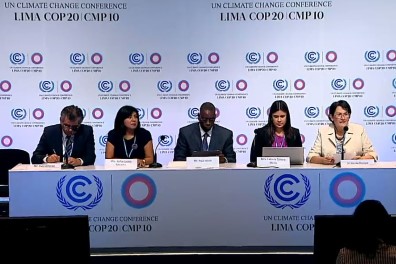“The post-2015 sustainable development framework should prioritize a goal on water security for all”, declared Dr. Nicole Bernex – member of the GWP Technical Committee – who chaired the briefing. She said that a water goal would contribute to the successful implementation of the National Adaptation Plans (NAPs), which strive to reduce the vulnerability to the impacts of climate change.
The other panelists at the GWP press briefing were: Bai Mass Taal, Executive Secretary, AMCOW, Fabiola Tábora Merlo, Executive Secretary, GWP Central America, Paul Hinds, representative of GWP Caribbean, Sofía Castro, WACDEP Programme Manager, GWP South America and Yury Alfonso Pinto Ortiz, Executive Secretary of the Peruvian Water Authority (ANA).
The panelists addressed two questions: What are the key experiences that you would like to share from your region/country on water and climate change, and in particular the WACDEP experiences from the work of GWP? What key outcome would you like to see from COP20 in relation to water security?
Need for Secure Funding
“We need to develop programmes that are resilient to climate change”, said Bai Mass Taal, and that is why AMCOW has developed the WACDEP programme together with GWP. This a good partnership and the programme is working, but he stressed the need to incorporate long-term funding for the initiative in the UN climate negotiations, to ensure that climate affected countries can benefit from it.
“Central America is one of the most vulnerable regions in the world to climate change. Because of its geographical location it is affected by more intense and frequent hydro-meteorological events, like droughts and floods. Through the WACDEP programme we have started to develop some actions that can help reduce the vulnerability to climate change, for instance we are analyzing how water security has been included in adaptation policies and strategies. We learned that water has been included, but the actions listed in the plans are not being carried out, for different reasons,” said Fabiola Tábora Merlo. She voiced the hope that the UN negotiations would ensure a more operationalized platform to access the Green Climate Fund.
Paul Hinds brought up the south-south knowledge exchange between Africa and the Caribbean on water security and climate resilient development, which was initiated last summer. The experience of this has highlighted the need to build and establish priorities, and to align these with high-level commitments and work programmes.
Sofía Castro listed a number of WACDEP activities in South America, and also said she hopes that the institutional capacity could be improved to better understand the implications of climate change adaptation.
Adaptive Designs and Change of Perspective
Wrapping up the session, Dr. Bernex addressed a question to the floor, to Professor Kalanithy Vairavamoorthy of Sri Lanka – also a member of the GWP Technical Committee – about what key outcomes he would like to see from the COP20 negotiations in relation to water security. Professor Vaivamoorthy said that from an urban water perspective he would like a recognition of the uncertainties associated with water availability and water resources, and he called for more adaptive designs that can respond to these uncertainties.
“Also very important is a change in the perspective in the way in which we view water. We need to think of water from a more productive use, thinking of what is it that we want water to do for us, and how we can match the quality and quantity of water for that intended use. My message is: in many developing countries there is a huge opportunity for us to rethink the way in which we manage our resources, and I think that the cities of the future will emerge in those developing countries,” said Professor Vaivaramoorthy.

